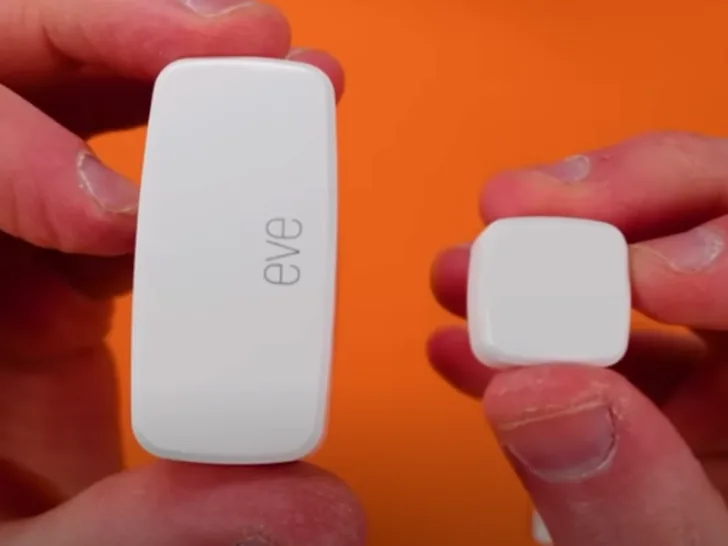The choice between the Eve and Onvis door sensors boils down to several crucial factors. Installation and setup are straightforward for both, ensuring a user-friendly experience. Compatibility is a key consideration, with Eve exclusive to Apple HomeKit, making it ideal for Apple-centric households, while Onvis offers versatility by working with HomeKit, Alexa, and Google Home, catering to a wider range of smart home ecosystems.
Battery life is another pivotal aspect, with Eve boasting a rechargeable battery that can last up to 5 years, reducing long-term maintenance. Onvis, with replaceable batteries, provides flexibility but may require more frequent changes. Design preferences also play a role, with Eve’s minimalist aesthetics appealing to those who prioritize style.
Pricing is a factor to consider, and Onvis often provides a budget-friendly option, although Eve’s occasional promotions can level the playing field. Ultimately, your choice depends on your specific needs, existing smart home devices, and design sensibilities.
Both Eve and Onvis are dependable door sensors, offering reliability and security, making them suitable choices for enhancing your home’s automation and security.
By continuing to use this website you agree to our Terms of Use. If you don't agree to our Terms, you are not allowed to continue using this website.
Introducing Eve and Onvis Door Sensors

If you’re on the hunt for a smart door sensor, Eve and Onvis both offer great options. Let’s compare these two popular brands to help you choose the best one for your needs.
| Aspect | Eve Door & Window | Onvis Door Sensor |
|---|---|---|
| Design | Minimalist, black or white, blends with decor | Generic appearance |
| Setup | Easy, 10 minutes | Easy, 10 minutes |
| Compatibility | Works with HomeKit, iPhone, and HomeKit accessories | Works with most smart home systems (SmartThings, Nest, Ring) |
| Alerts | Push notifications, SMS, and email alerts | Push notifications and SMS alerts |
| Email Alerts | Yes | No |
| Battery Life | Up to 2 years | Up to 5 years |
Installation and Setup Comparison
When it comes to installation and setup, Eve and Onvis door sensors are pretty comparable. Both are designed to be easy to install yourself without professional help. However, there are a few differences to consider:
Compatibility
The Eve Door & Window sensor is only compatible with Apple HomeKit, so you’ll need an iOS device to set it up and control it.

The Onvis sensor works with both Amazon Alexa and Google Home in addition to HomeKit, so it’s compatible with more smart home systems if you have a mix of devices.
Battery Life
The Eve sensor has a built-in rechargeable battery that can last up to 5 years between charges. The Onvis sensor uses replaceable CR2 batteries that provide power for up to 2 years. So, the Eve probably requires less maintenance in the long run, but the Onvis gives you the option to quickly swap in new batteries if it dies.
Installation
Both sensors attach to doors or windows using strong double-sided tape or screws. The Eve sensor is a bit more low profile, about the size of a few stacked quarters.

The Onvis is slightly larger, comparable to a few stacked half dollars. So, the Eve sensor may look a bit sleeker installed, but either sensor will be quite discreet.
App Integration and Notifications
When it comes to smart home integration, both Eve and Onvis offer options to connect their door sensors to popular ecosystems. The level of functionality will depend on which system you currently have or prefer.
Apple HomeKit
If you’re an iOS user, Eve’s door sensor seamlessly integrates with the Apple HomeKit platform. You’ll be able to view the sensor’s status, receive notifications, and trigger automation using the Home app on your iPhone or iPad. For example, you can set up an automation so that when the front door opens after sunset, your porch light turns on automatically.
With Onvis, you’ll need to use their own app to view details and manage the door sensor. While Onvis sensors are HomeKit-compatible, the integration is more limited. You can view the sensor in the Home app and receive basic on/off notifications, but you won’t be able to create the type of advanced automation possible with Eve’s sensor.
SmartThings and Alexa
If you prefer SmartThings or Alexa, Onvis may be the better choice. Their door sensor fully integrates with both platforms, allowing you to view live status, receive alerts, and trigger automation with compatible devices like lights, locks, and thermostats. Using the SmartThings app or Alexa voice commands, you’ll have extensive control over the Onvis sensor.
While Eve’s sensor can be added as an accessory in the SmartThings and Alexa apps, functionality is minimal. You’ll only receive basic on/off notifications – no status viewing or automation options. For maximum smart home integration with these ecosystems, Onvis is really the way to go.
Verdict: Which Door Sensor Should You Choose?
So which door sensor should you go with Eve or Onvis? Both options are great in their own ways, but here are some factors to consider when making your choice:
Price
If budget is a concern, Onvis is the more affordable option. Their door sensors typically retail for under $30, while Eve’s latest model is around $40.
However, Eve frequently has sales and promotions that can drop the price by 20-30%.
Compatibility
Do you have a preferred smart home ecosystem? Eve works exclusively with HomeKit, Apple’s smart home platform, while Onvis supports both HomeKit and Alexa.
If you have an Echo or primarily use Alexa to control your smart home, Onvis may be a bit more versatile.
Design
Eve’s door sensors have a sleek, minimalistic design that blends well in most homes. Onvis’s sensors are a bit more utilitarian in appearance.

For some, design and aesthetics matter when choosing smart home devices, so keep that in mind.
Features
Both Eve and Onvis door sensors detect when a door or window is opened or closed and trigger automation based on that activity.
However, Eve’s latest sensor also has a built-in temperature sensor so you can create automation based on temperature changes, like turning on a fan. Eve also has additional security features like tamper detection.
FAQs
Are there any troubleshooting tips available if I encounter issues during installation?
Both Eve and Onvis provide customer support resources and troubleshooting guides to assist users in case of installation hiccups.
These guides typically cover common issues such as connectivity problems, sensor placement, and app-related concerns.
Do I need any additional tools or equipment for the installation process?
Generally, the installation of both Eve and Onvis door sensors doesn’t require additional tools or equipment. They typically come with adhesive strips or mounting hardware for securing the sensors to your doors or windows.
However, having a smartphone with Bluetooth capability and internet access is essential for the setup process.
Can I easily relocate these sensors if I need to change their placement?
Yes, both Eve and Onvis sensors are designed to be relatively easy to relocate. You can usually detach them from their current location and reattach them elsewhere, as long as you follow the manufacturer’s guidelines for removal and reinstallation.
Keep in mind that this process may involve replacing adhesive strips or mounting hardware, which is typically available as replacement accessories.
Can these door sensors be used outdoors, or are they only suitable for indoor use?
Both Eve and Onvis door sensors are primarily designed for indoor use. Using them outdoors may expose them to weather conditions that could affect their performance and longevity.
For outdoor applications, it’s advisable to explore specialized outdoor-rated sensors to ensure reliability and durability in outdoor environments.
Conclusion
- In making your decision between the Eve and Onvis door sensors, it’s vital to evaluate key factors such as compatibility, battery longevity, design aesthetics, and pricing.
- Onvis stands out for its broader compatibility across various smart home systems, offering flexibility for diverse setups.
- On the flip side, Eve’s door sensor impresses with its minimalist design and extended battery life, which can lead to less frequent maintenance.
- Your ultimate choice should be guided by the alignment of these factors with your specific requirements, including your preference for a particular smart home ecosystem and the importance of sensor aesthetics in your living space.
- In essence, both Eve and Onvis deliver reliability and security, enhancing your home’s automation and safeguarding your doors and windows effectively.
- The best choice hinges on the unique blend of features that resonate most with your priorities in a smart door sensor, ensuring a seamless and personalized integration into your smart home setup.

